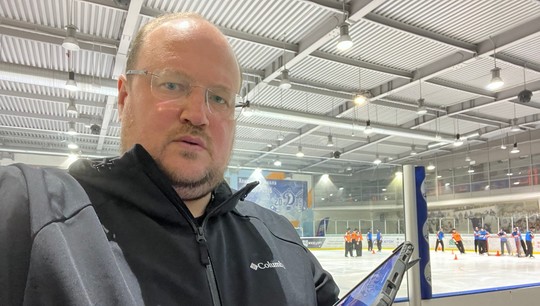Ural Federal University Experts Create System for KHL Athletes and Referees
Anton Ezhov, a postgraduate student of the UrFU Department of Physical Education, under the guidance of Professor Anna Zakharova, developed a neuromuscular warm-up system for diagnosing and activating the condition of athletes. The development was called Co-Reaction (from the English coordination and reaction). The system was tested on athletes: hockey players, football players – from beginners, 6-7 years old, to professionals. The results of testing hockey players of the Night Hockey League are published in the authoritative journal “Chelovek. Sport. Medicina” (“Man. Sport. Medicine”). Erfan Taghvaei, a Master’s student in the High Performance Sport program from Iran, also contributed to this article.
“We have developed a system of psychophysiological diagnostics that was originally intended as a kind of warm-up for athletes. It helps to “turn on” the brain, and from the very first seconds of a game, an athlete can perceive a high-intensity load. We started by testing the system on hockey and soccer players. When we had collected the necessary amount of data and learned how to interpret the quantitative and qualitative results, we were offered to participate in the training camp of the KHL referee corps, as hockey referees experience a serious load during the game,” explains Anton Ezhov.
The test is used to check the eye-hand coordination, the strength of the nervous system and the type of temperament in both athletes and referees.
“Eye-hand coordination is the coherence of the human body’s systems, including the ability to process information and perform the correct action. The faster the eye-hand coordination, the faster the referee can react to a change in the game situation, make a decision and take an action – raise his hand, stop the game or something else. The referees passed this test at a level comparable to that of professional athletes and showed good stability of results both in competitive work and in conditions of high-intensity physical activity,” Anton Ezhov told KHL.RU.
The data obtained helps to understand how psychologically stable a person is in stressful situations. It helps to understand whether an athlete is able to maintain a high reaction speed in the face of accompanying external factors – the level of importance of the game, pressure from the stands, players and coaches.
“By tracking changes in these parameters, we can suggest what needs to be done to maintain efficiency for as long as possible. In addition, there are basic recommendations about load tolerance and the ability to withstand psychological pressure. This will help to make the parameters more stable and, as a result, the work more efficient,” adds Anton Ezhov.
As experts explain, the parameters of psychological resilience can be coached through various exercises, which will help to return to the state of maximum effectiveness.
“Conventionally, it is the ability to maintain concentration throughout a hockey game, for example. More specifically, it is the correlation of being able to maintain your reaction speed and keep it up for as long as possible, despite the burden of responsibility that comes with the game,” Ezhov adds.

